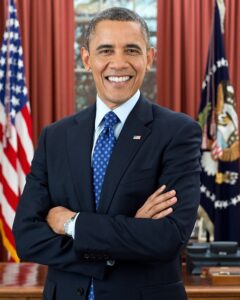History was created in America when Barack Obama was elected as the 44th President of the United States in 2008, becoming the first African American to hold the highest office in the country. Obama’s presidency was marked by a series of achievements, challenges, and controversies that shaped his legacy and continue to influence American politics and society today. As president, he called for a new beginning of relations between the Muslim world and the West, based on common interests and mutual understanding and respect.

His early life and education Barack Obama was born on August 4, 1961, in Honolulu, Hawaii to a Kenyan father and an American mother. Barack Obama’s full name is Barack Hussein Obama, his parents separated when he was two, and he was raised by his mother and grandparents in Hawaii.
Obama attended the Punahou School, a prestigious prep school in Honolulu, before attending Occidental College in Los Angeles for two years. He then transferred to Columbia University in New York City, where he earned a bachelor’s degree in political science in 1983.
After college, Obama worked as a community organizer in Chicago before attending Harvard Law School. Obama worked in the private sector for a year before coming to Chicago to work. She worked with low-income residents on the city’s South Side and helped set up job training programs and after-school programs for young people.
In 1988, Obama enrolled at Harvard Law School, where he became the first black president of the Harvard Law Review. He graduated with a law degree in 1991 and returned to Chicago to work as a civil rights attorney. In his personal life, he is married to Michelle Obama and they have two daughters, Malia and Sasha. Obama and Michelle met while working at a law firm in Chicago in 1989 and married in 1992.
Political Rise and Presidency
Obama began his political career in 1997 as a senator from the state of Illinois and was elected to the US Senate in 2004. In 2008, he ran for president and became the first black president of the United States, defeating Republican candidate John McCain.
During his presidency, Obama implemented several major policies, including the Affordable Care Act (also known as Obamacare), the Dodd–Frank Wall Street Reform and Consumer Protection Act, and the repeal of “Don’t Ask, Don’t Tell”. “Policy that prohibited LGBTQ + individuals from serving openly in the military.
Obama faced significant challenges during his presidency, including the 2008 economic downturn, the rise of the Islamic State, and the 2012 Sandy Hook Elementary School shooting. He also faced significant opposition from Republican lawmakers, who sought to block his policies and initiatives.
legacy and influence
Obama’s presidency had a profound effect on American politics and society. He worked to promote health care access, expand LGBTQ+ rights, and address climate change, among other issues. He also played a key role in the landmark Paris Climate Agreement, which aimed to combat global warming and reduce carbon emissions.
After leaving office in 2017, Obama remained an influential figure in American politics and society. He continues to advocate for social justice and civic engagement through the Obama Foundation, which he founded in 2014. He has also written several books including his memoir “A Promised Land”, which was released in 2020.
Obama has been awarded the Nobel Peace Prize for the year 2009 for his extraordinary efforts to strengthen international diplomacy and cooperation between peoples. The committee attaches particular importance to Obama’s vision and work for a world without nuclear weapons.
His important decision
Several important decisions were taken during the presidency of Barack Obama that had a significant impact on American politics and society. Some of the major decisions taken during his tenure are as follows:
The Affordable Care Act: In 2010, Obama signed into law the Affordable Care Act (ACA), which aimed to provide affordable healthcare to millions of Americans. The ACA expanded Medicaid coverage, prohibited insurers from denying coverage because of pre-existing conditions, and allowed young adults to remain on their parents’ insurance until age 26.
Dodd-Frank Wall Street Reform and Consumer Protection Act: In response to the 2008 financial crisis, Obama signed the Dodd-Frank Act in 2010. The purpose of this law is to regulate the financial industry, prevent future financial crises, and protect consumers from abusive financial practices.
Repeal of “Don’t Ask, Don’t Tell”: In 2011, Obama signed a law that repealed the “Don’t Ask, Don’t Tell” policy, which prohibited openly gay, lesbian, and bisexual individuals from serving Had done it. Army. The repeal allowed LGBTQ+ individuals to serve openly without fear of discrimination or dismissal.
Paris Climate Agreement: In 2015, Obama helped broker the historic Paris Climate Agreement, which aimed to combat global warming by reducing carbon emissions. The agreement was signed by nearly 200 countries and was seen as an important step in addressing climate change.
Killing of Osama bin Laden: In 2011, Obama authorized a raid by US Navy SEALs that resulted in the death of Osama bin Laden, the leader of al-Qaeda and the mastermind behind the 9/11 terrorist attacks. The operation was seen as a major victory in the fight against terrorism.
Conclusion
The presidency of Barack Obama was marked by both historic achievements and significant challenges. He made history as the first African American President of the United States and implemented policies that had a significant impact on American politics and society. Today, his legacy continues to shape political discourse and inspire future generations of leaders.
Leave a Reply